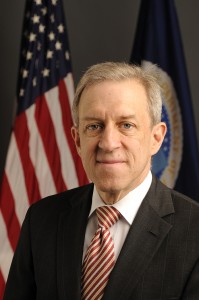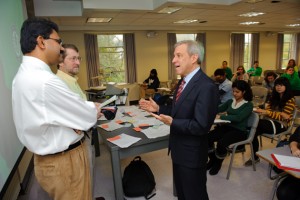
The next time you pull a jar of goodies off the shelf in the grocery store to check its calories or fat content, you might give a nod to Jerold Mande ’78 (CANR), before tossing it in your cart.
After all, the ubiquitous Nutrition Facts label that appears on virtually all packaged foods was created by Mande when he served as a supervisory policy analyst at the U.S. Food and Drug Administration in 1992. The beautifully simple yet informative chart earned Mande the Presidential Award for Design Excellence in 1997.
Today, Mande serves as senior advisor to the Under Secretary for Food, Nutrition, and Consumer Services at the U.S. Department of Agriculture, where he helps millions of hungry and poor Americans daily, through programs like the Supplemental Nutrition Assistance Program (SNAP), more commonly known as food stamps; the Women, Infants, and Children (WIC) program for low-income mothers and their families; and the National School Lunch Program (NSLP).
Fighting hunger and obesity
The challenge is enormous. The number of people using food stamps hit an all-time high in May 2011. According to the USDA, 45.7 million Americans used the SNAP program so far this year, up from 28.3 million people in 2008.
“Feeding programs, such as SNAP, school meals, and WIC, make up 70 percent of the USDA’s budget,” says Mande, this year’s recipient of the UConn Alumni Association’s Distinguished Alumni Award. “We are spending about $100 billion in 2011 on these hunger programs. Most people don’t know that. They assume most of our budget goes toward agriculture subsidies for farmers. The truth is it goes mostly to families who are struggling to pay their bills and put food on the table.”

Mande is one of 10 individuals who will receive awards from the UConn Alumni Association on Oct. 14 as part of the University’s annual Homecoming festivities.
Mande says that besides helping record numbers of people put food on the table, his office is dealing with a daunting national obesity epidemic. Twenty years ago, he says, not a single state had more than 15 percent of its population who were obese. Today, not a single state has less than 15 percent of its population who are obese. More than two-thirds of adult Americans are either overweight or obese, and the public health impact of this will be enormous.
“My greatest challenge in my current position is to fight hunger and obesity at the same time, often in the same person,” Mande says. “We have to review our hunger programs to make sure they are part of the obesity solution and not part of the problem. That’s a new challenge that hunger and nutrition experts are working together to solve.”
“Many people don’t understand how someone who is food insecure ends up obese,” he says. “Many people falsely believe it’s the obese person’s fault that they are obese. The truth is that it’s really not about personal responsibility. The data show clearly that we live in a toxic food environment. Changing that environment and getting the public to understand that it’s the environment and not the lack of discipline that are behind the obesity epidemic are my greatest challenges.”
From daily menus to national policy
As a UConn student, Mande says his interests ran from political science to art to chemical engineering before he finally settled on nutrition. The U.S. Food and Drug Administration’s decision to ban red dye #2 in 1976, and with it red M&Ms, motivated Mande to want to learn more.

“I wanted to understand why the government was more concerned with the red dye in the shell of the M&M that posed a theoretical risk of cancer, but was doing little about the sugar, fat, and salt that posed a seemingly greater public health threat by contributing to cancer, heart disease, and stroke – diseases that kill hundreds of thousands in our country each year.”
Looking back, Mande, 57, says he never envisioned his career path would take him from writing up daily menus for students in his UConn dorm to helping set national nutrition policies for the United States and working for three presidents.
“When I began studying nutrition, I knew I wanted to know more about food and health,” he says. “My mom is a great cook, and gave me my interest in food. My dad, a World War II veteran, sparked my interest in public service. He designed and built fire safety systems. Once I started to understand nutrition and health, I realized I didn’t have the patience to change how people ate one person at a time. Government seemed like the right approach. I still believe that. It is the place where the public interest comes first.”
Prior to working at the federal level, Mande was the associate director for public policy at the Yale Cancer Center at Yale University, where he devised a national model that leveraged state leadership to increase cancer prevention and control. He began his legislative career as an assistant to then-U.S. Rep. Al Gore, D-Tennessee. He managed Gore’s health and environment agenda, helping Gore write the nation’s organ donation and transplantation laws.
Most recently, he served as Deputy Under Secretary for Food Safety at the USDA, where he oversaw the federal Food Safety and Inspection Service (FSIS), the public health agency responsible for ensuring that the nation’s commercial meat, poultry, and egg products are safe.
Mande says the country has made great gains in improving food safety, yet new challenges continue to arise.
“Our food is really safe and getting safer,” he says. “When I joined the FDA in 1991, there were 8 cases per 100,000 people per year of E. coli 0157:H7, one of the most dangerous foodborne illnesses. Today, there is less than 1 per year.
“Our most significant food safety challenge today is adequate support for the FDA’s food safety program, especially for imported foods. More than three-quarters of our seafood and more than half of our fruits and vegetables are now imported, but the FDA is barely able to inspect these foods because they haven’t received the resources needed to do so.”
Nutrition – an exciting career
When asked what advice he would give current students pursuing careers in nutrition, Mande says having both a solid background in science and strong writing skills is key.
“Food and nutrition are important fields that have never been more exciting and interesting. We still are researching basic questions. We need nutrition scientists and policy makers who understand the science and can act on it. Writing skills are also critical. I overlooked writing as a science major, but leading change requires strong communication skills. I use my writing skills more than my science training to get my work done in Washington. It is also important to study a broad range of subjects such as history and art. I would not have thought of creating an iconic graphic design for the Nutrition Facts label if I hadn’t studied art while at UConn. I would not get as much done in Washington if I hadn’t benefited from reading about the mistakes and successes of others.”
Raised in Westport, Mande lives in Hamden, Conn. and Bethesda, Md. with his wife, Elizabeth Drye, a pediatrician and health policy expert who develops health care quality measures at Yale. They have two boys, Thomas, 11, and Matthew, 9, who are both avid UConn sports fans.
Other Alumni Association awards being presented Oct. 14 are:
Service Award – Christine Lodewick ’67 (CLAS), who served two terms on the Association’s Board of Directors and was co-chair of the Alumni Campaign, among other activities;
Graduate of the Last Decade – U.S. Rep. Christopher Murphy ’02 JD, (D-5th District);
Humanitarian Award – Bette Gebrian ’77 (NUR), ’93 (CLAS), public health director of the Haitian Health Foundation;
Honorary Alumni Award – Phillip Blumberg, emeritus dean and professor of law and business at the UConn School of Law.
University Service Award – Karla Fox, executive director of institutional effectiveness in the Office of the Provost and interim dean of the School of Business;
Excellence in Teaching (Undergraduate) – Kristin Kelley, associate professor of political science in the College of Liberal Arts and Sciences;
Excellence in Teaching (Graduate) – Jennifer Sterling-Folker, professor of political science in the College of Liberal Arts and Sciences;
Excellence in Research (Sciences) – Manos Anagnostou, professor of civil and environmental engineering and Northeast Utilities Endowed Chair in Environmental Engineering in the School of Engineering; and
Excellence in Research (Humanities/Social Sciences) – Seth Kalichman, professor of psychology in the College of Liberal Arts and Sciences.



